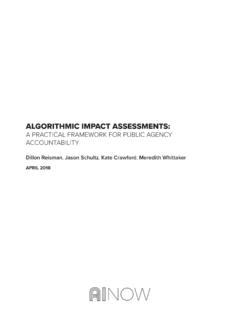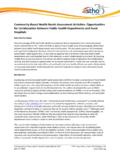Transcription of A Public Policy Statement - Gordon Commission
1 A Public Policy Statement The Gordon Commission on the Future of assessment in Education Table of Contents Table of contents 4. Executive 5. 5. 6. Transforming assessment to Support Teaching, Learning and Human 7. Reconsidering assessment : Why, What and How We 9. Moving Forward: The 11. 13. In the Realm of State Collaboration and 13. In the Realm of Federal 14. In the Realm of National Research and 15. About the Gordon Commission on The Future of assessment in 16. Mission of the 17. Commission 18. 22. 3. Preface Preface The Gordon Commission on the Future of assessment in Education was established by Educational Testing Service in January 2011 and given a two-year tenure.
2 The members of the Commission recognize that the future of assessment will be influenced by what the research and development (R&D) and the assessment production communities generate as instruments and procedures for the assessment in education enterprise. However, we are very much aware that equally determinative of the future will be the judgments and preferences of the policymakers who decide what will be required and what practitioners and the Public will expect. In recognition of the crucial role played by policymakers, the Executive Council of the Gordon Commission has given special attention to the develop- ment of a Policy Statement that concludes with three recommendations directed at those who make Policy concerning education and its assessment .
3 The Statement has been prepared by James Pellegrino, co-Chair of the Commission , and Lauren Resnick, member of the Executive Council, with input from Sharon Lynn Kagan, consultant to the Chair, and other members of the Executive Council Randy Bennett, Eva Baker, Bob Mislevy, Lorrie Shepard, Louis Gomez and Edmund W. Gordon and the assistance of Richard Colvin as writing consultant. This Public Policy Statement represents the authors' sense of recommendations that are implicit in the work of the Commission . However, it has not been vetted by the members of the Gordon Commission and thus it should not be concluded that any given member of the Commission endorses the specifics included herein.
4 Edmund W. Gordon Chairperson The Gordon Commission on the Future of assessment in Education 4. Executive Summary Executive Summary The Gordon Commission on the Future of assessment in Education was created to consider the nature and content of American education during the 21st century and how assessment can be used most effectively to advance that vision by serving the educational and informational needs of students, teachers and society. The Commission 's goal in issuing this brief Public Policy Statement is to stimulate a productive national conversation about assessment and its relationship to teaching and learning at a time when developments in assessment and education in the United States present a remarkable opportunity to reconceptualize the purposes of educational assessments.
5 The Statement advances arguments for: 1. T. ransforming assessment to Support Teaching, Learning and Human Development 2. R. econsidering assessment : Why, What and How We Assess 3. M. oving Forward: The Opportunity Recommendations In the Realm of State Collaboration and Policy It is recommended that states create a permanent Council on Educational Assessments modeled on the Education Commission of the States. In the Realm of Federal Policy It is recommended that the president and Congress build on various models to encourage experimentation with different approaches to assessment and accountability.
6 In the Realm of National Research and Development It is recommended that the Department of Education, the Department of Defense, the National Science Foundation, and the National Institute of Child Health and Human Development, in collaboration with the philanthropic community, not-for-profit and for-profit sectors, professional teacher organizations and universities commit to a 10-year research and development effort to strengthen the capacity of assessment . 5. Introduction Introduction The Gordon Commission on the Future of assessment in Education was created to consider the nature and content of American education during the 21st century and how assessment can be used most effectively to advance that vision by serving the educa- tional and informational needs of students, teachers and society.
7 The Commission 's goal in issuing this brief Public Policy statement1 is to stimulate a productive national conversa- tion about assessment and its relationship to learning. The work of the Commission and this report come at a propitious time. The Common Core State Standards in Mathematics and English Language Arts adopted by 45 states and the District of Columbia, as well as Next Generation Science Standards that are under development, stress problem-solving, creativity and critical thinking over the memorization of isolated facts and decontextualized skills. Assessments meant to embody and reinforce those standards are under develop- ment and will be given for the first time in 2015.
8 Over the next few years states will be deeply engaged in implementing the standards and preparing for the new assessments. These developments have heightened awareness among educators and state and federal policymakers of the critical relationships among more rigorous standards, curriculum, instruction and appropriate assessment , and have created an opportunity to address issues of long standing. This Policy Statement capitalizes on that opportunity to bring about a fundamental reconceptualization of the purposes of educational assessments. This Public Policy Statement represents the authors' sense of recommendations that are implicit in the work of the Commission .
9 1 . However, it has not been vetted by the members of the Gordon Commission and thus it should not be concluded that any given member of the Commission endorses the specifics included herein. The Gordon Commission on the Future of assessment in Education 6. Transforming assessment to Support Teaching, Learning and Human Development Transforming assessment to Support Teaching, Learning and Human Development Although assessment , broadly construed, is a central element of education and must be aligned with both teaching and learning goals, it is not the only or even the major.
10 Tool for improving student outcomes. Indeed, for education to be effective, schools must be designed with clear and precise teaching and learning goals in mind and supported in ways that make them likely to reach those goals; teachers must be provided with the appropriate instructional materials and professional development; and other resources including time, technology and teachers' skills must be deployed strategically. To be helpful in achieving the learning goals laid out in the Common Core, assessments must fully represent the competencies that the increasingly complex and changing world demands.




